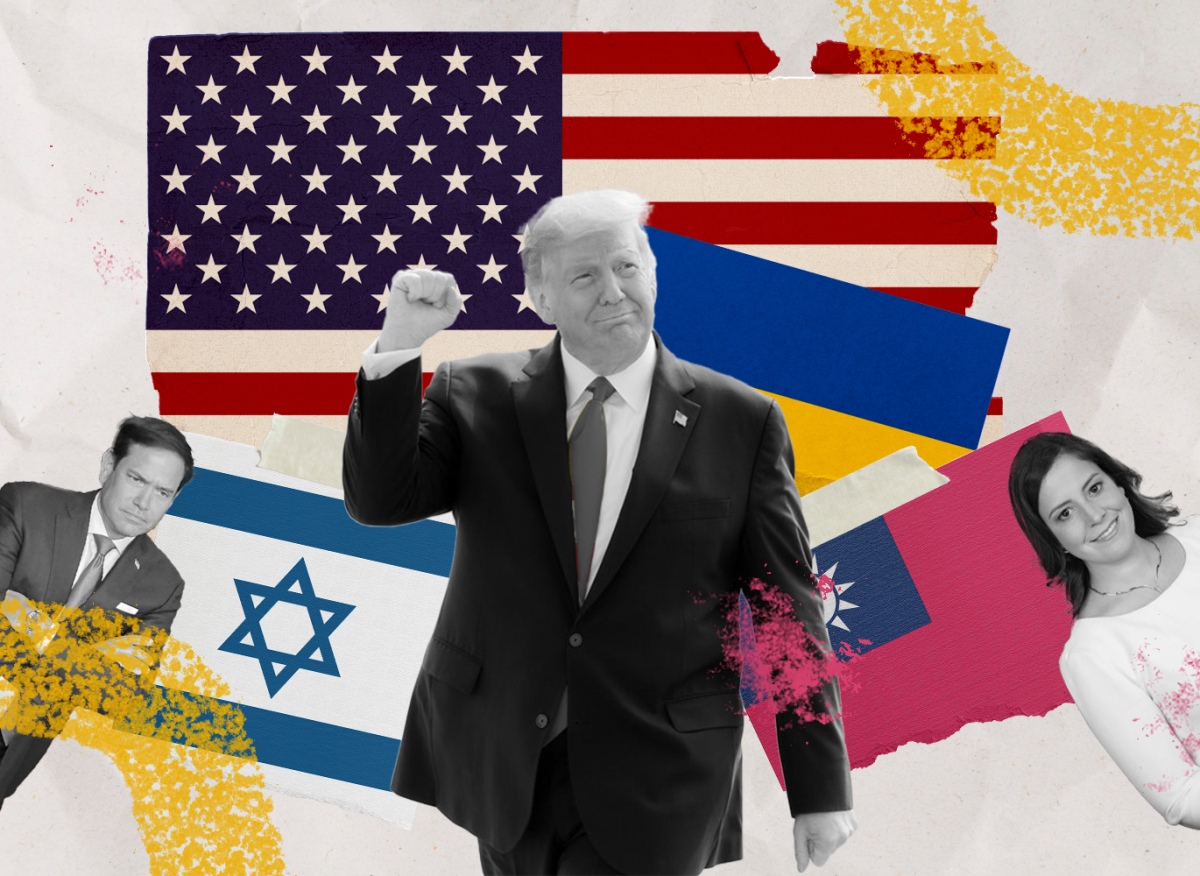In many ways, America is a proud nation: It thrives on patriotism; politicians campaigned to “save America”; people believe they’re more advanced than other nations (so advanced they couldn’t even name other countries on the map, telling from personal experience). The consequences of which is obviously the constituency focused primarily on domestic policy and their everyday life, not considering the international impact of the election.
In truth, if America looks a few inches (or centimeters, if we want to be inclusive) beyond its border, it will find a world in turmoil. Currently, we have a war going on in Ukraine and Israel. Both wars are at risk of escalation. China is increasing its aggression in the South China Sea, threatening neighboring countries and alarming Taiwan. So far, death and injuries are approaching 500,000 in Ukraine and more than 44,000 have been killed in Gaza.
The wars are not only impacting the countries involved – it also impacts the United States. Global supply chain will be impacted, thus war increases inflationary pressure which the Americans can feel on a daily basis.
Considering all the global and domestic impact listed above, we must ask the question: how will President Trump foreign policy in his second term? In this article we’ll examine the key areas that his foreign policy will influence.
Isolationist?
Many people are worried about the isolationist sentiment in the Republican party. Many prominent right-wing figures, including Tucker Carlson, Vivek Ramaswamy and Senator Josh Hawley, have expressed that the Republican Party should prioritize America’s problem instead of other countries, which led to their opposition to aid to the US allies Ukraine and ISrael. They also tend to have a negative attitude toward multinational organizations, such as NATO, and support defunding or diverging from these organizations. Republican figures who are more Reganist in their foreign policy approach and want to be involved in world affairs, are deemed “neocons” and bordered in the party, as we can see that play out with Nikki Haley in the Republican primary.
Trump has many times said he wants the war in Ukraine to “end” without outlining a specific plan. However, he is also a vocal supporter of Israel. Factually, he isn’t a strict isolationist that the far-right influencers paint him to be. Trump’s cabinet picks also are not isolationists. Marco Rubio, nominated for Secretary of States, senator from Florida, is known for being a foreign policy hawk. He fully supports Israel’s war on Hamas, has a hardline view on China and seeks intervention in foreign policy on Latin America countries.
Looking at his first term, Trump introduced the Abraham Accord, which normalized the relationship between Arab countries and Israel as an attempt to isolate Iran. He targeted terrorist organizations Islamic States in Syria and Houthis in Yemen. As for Russia, he continued the Obama-era sanction and even extended the sanctions.
With all that said, Trump isn’t seeking to leave other countries alone, as some far-right extremists have hoped. The question is how he will intervene.
Ukraine
Foreign policy expert Richard Haass, former president of Council on Foreign Relation and foreign policy advisor in the George W. Bush Administration, explained that currently the problem of Ukraine is that there isn’t a clear definition of victory. Both the Biden administration and the European Union called for Ukraine victory, but what exactly is victory? Recovering full territory for Ukraine is too costly and almost impossible to achieve. The war will likely end, as Czech President Petr Pavel, a former NATO general explained, with something in the middle of a complete Russian victory and a complete Ukrainian victory.
Recently, Biden permitted Ukraine to launch missile deeper into Russia, potentially boosting Ukraine’s offensive capacity and aim to send $9 billion in military aid to Ukraine, which are seen as securing Ukraine support before Trump took office. Combined with Republican control of the house and senate, future aid for Ukraine is likely to be in jeopardy.
For most part of the campaign, Trump has criticized the United States giving aid to Ukraine. Ukrainian President Volodymyr Zelensky has said that Trump doesn’t understand the conflict in Ukraine and his running mate J.D. Vance is too radical. In September, Zelensky met with Trump and both sides called it a successful meeting. However, Trump refused to promise Ukraine will not cede its territory to Russia as a part of the peace deal. Recently, Trump called Zelensky along with Billionaire Elon Musk for a potential peace talk. Musk has been supporting the Ukraine war effort through providing internet service using his Starlink satellites, and Zelensky reportedly did not feel despair after the phone call with Trump as Trump promised not to abandon Ukraine.
Trump is very likely not going to support a plan that promised Ukraine to regain its full territory, since that requires much more aid to Ukraine, which contradicted his campaign on less aid going into the war. If he were to “stop the war on day one” as he promised to do, the war would end along the current border of Ukraine and Russia, with Ukraine sacrificing its territory. This response can gather international condemnation, but at the same time, allow Ukraine to rebuild. What is unclear at this point is Trump’s definition of victory regarding the Russia-Ukraine war.
Israel
In Trump’s first administration, he showed support for the state of Israel in several ways. In May 2018, Trump recognized Jerusalem as the capital of Israel and moved the the United States embassy to Jerusalem. Prior to that, the city of Jerusalem is in dispute between Israel and Palestinian authorities. Trump’s move drew criticism from Middle Eastern countries and the United Nation, since this move further upset the neutrality of the United States in the Israeli-Palestinian conflict. In June, the Trump Administration announced it will withdraw from the U.N. Human Rights Council, citing its bias against Israel as one of the reasons. In January 2020, Trump and Israeli Prime Minister Benjamin Netanyahu announced a new peace plan for Israel which heavily favored Israel with a large portion of the West Bank and Jerusalem. In September 2020, Israel signed the agreements that normalized relationships with other Arab countries, which unite the Arab Gulf with Israel and isolate Iran.
During the campaign, Trump warned that those taking American hostages will pay a big price. Rubio meanwhile stated that he will not support a ceasefire deal and blamed the war entirely on Hamas. Former Arkansas Governor Mike Huckabee, nominated for ambassador to Israel, went so far as to say there’s no such thing as “Palestine”. Compared to the war in Ukraine, Trump showed significantly more support for Israel.
One thing that’s likely in the next Trump Administration is a divergence from international organization. The International Criminal Court recently issued an arrest warrant for Benjamin Netenyahu, and the United Nations condemned Israel several times for humanitarian crimes. Similar to his first term, Trump can distance the United States from these organizations he deemed to be in conflict with his interest. He can impose sanctions on ICC and refuse funding for certain United Nation departments, such as UNRWA (Relief and Works Agency for Palestine) for its potential involvement in the Oct. 7 attack. Overall, Trump is likely to tilt the scale in Israel’s favor compared to the current administration with less focus on Palestinian relief.
Taiwan
Although not directly in war, Taiwan is what most people bring up if they talk about the potential of “World War III”, demonstrating it to be one of the regions that’s likely to be involved in conflict with major world powers. Despite popular belief that Trump will abandon Taiwan, in his first term, Trump became the first president or president-elect who has spoken to a Taiwanese leader since 1979. He also increased the United States’s navy presence in the Taiwan Strait and increased arm sales to Taiwan. All of these actions are protective toward Taiwanese independence, which could be interpreted as Trump favored the Taiwanese government over the Chinese Communist Party, which called for a unified “one China” and undermines the democratic country’s sovereignty. However, between 2021 and 2024, Trump has criticized Taiwan for taking away America’s business in the chip industry and not paying enough for their defense. In a July 2024 poll, Taiwan preferred Biden, the democratic nominee at the time, to Trump.
Many times the United States’s intervention in other countries are out of humanitarian concerns, but the United States has concret reason to be concerned about Taiwan: semiconductors. Currently, the United States only produces 12% of semiconductor, while more than half of semiconductor and the most advanced types are produced in Taiwan. This technology is crucial in powering cars, phones, laptops and even weapon systems. If China annexed Taiwan and take over the semiconductor industry, they can undermine the United States’s national security and technological competitiveness.
Both parties have sought to boost chip production in the United States. In 2022, president Biden signed into law the Creating Helpful Incentives to Produce Semiconductors (CHIPS) and Science Act, which is a bipartisan act that increases investment in domestic production of chips. Under the CHIPS and Science Act, the United States’s awarded 6.6 billion dollars to the Taiwan semiconductor giant Taiwan Semiconductor Manufacturing Company (TSMC). Trump is likely to continue this policy and to some extent, decrease the United States’s dependency on Taiwan for chips.
Building up the domestic chip industry wouldn’t be quick. In the meantime, it’s very unlikely that Trump will completely abandon Taiwan, since it’s not in the United States’s interest to do so. As long as Taiwan shows a compelling interest in protecting themselves, for example, increasing spending on defense, the United States should still be an ally.
Final Thoughts
As we return to today’s question: how will President Trump foreign policy in his second term? The answer is not a traditional American global leadership or complete isolationism. He has different approaches to different regions, and his rhetoric often contradicts or undermines his actions. As James M. Lindsay, director of Fellowship Affairs at the Council on Foreign Relations, wrote in his blog The Water’s Edge: “Trump has always been less concerned about whether America is engaged in the world and more concerned about what it is getting from that engagement.” Trump is known for being unconventional in his approach toward foreign policy, and the world awaits to see if unconventionality will make it a more or less stable place.
Inauguration is in 54 days (Jan. 20, 2025)





Will Gonsior • May 5, 2025 at 9:50 pm
I’ll put my money on less, based on what we’ve seen so far. I’m also not sure the goal of the Ukrainian aid was full recovery by force so much as it was trying to stalemate until Russia lost all stability as a country and started to become incapable of waging a war effort; I’ve been saddened to see sanctions lifted on Russia and a lack of commitment to Ukrainian goals.